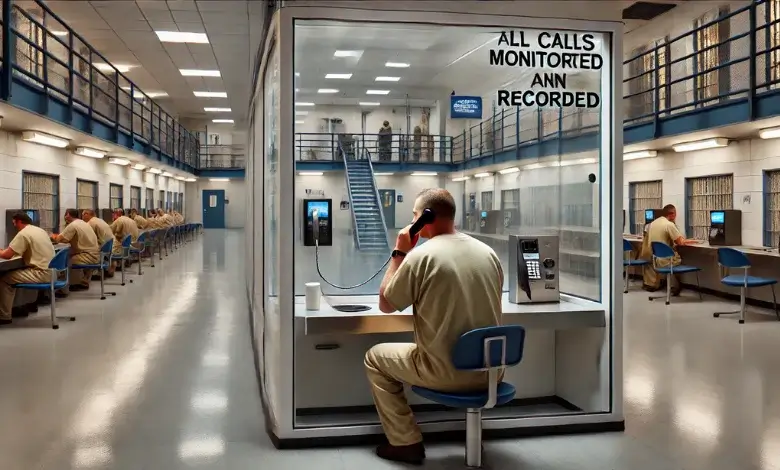Phone calls in prisons are more than just a means of communication—they’re a critical tool for ensuring security and maintaining order. But have you ever wondered, Are prison calls recorded in the USA? The simple answer is yes, with strict guidelines and a few exceptions.
In this article, we’ll explore how law enforcement of phone recordings in prison US works, why it’s necessary, and whether any prisons in the U.S. allow inmates to use cell phones. If you’ve ever been curious about the rules and implications of monitoring prison communication, keep reading.
Law Enforcement of Phone Recordings in Prison US: Why It Matters
Monitoring and recording phone calls in U.S. prisons is essential for maintaining security and preventing illegal activities. Law enforcement of phone recordings in prison US ensures that inmates do not use communication channels to orchestrate crimes, such as smuggling or violence.
This practice not only protects prison staff and inmates but also provides critical evidence for ongoing investigations. While some may see it as intrusive, it plays a pivotal role in upholding law and order within correctional facilities.
Are Prison Calls Recorded in the USA?
Yes, prison calls in the U.S. are routinely recorded. In fact, monitoring phone calls is standard practice in correctional facilities across the country. The primary purpose of this surveillance is to maintain security, prevent criminal activities from being orchestrated from inside, and gather evidence for ongoing investigations.
Legal Framework for Phone Monitoring
Under U.S. law, inmates have limited privacy rights. The Federal Communications Act and various state regulations allow prison officials to monitor and record calls. However, there are exceptions:
- Attorney-Client Privilege: Conversations between inmates and their attorneys are protected and cannot legally be recorded. These calls usually take place on dedicated lines.
- Consent: Inmates are typically informed that their calls are being recorded. This consent is often implied, as recorded warnings play before the connection.
Why Are Calls Recorded?

The reasons for recording prison calls include:
- Preventing Crime: Detecting plans for escapes, violence, or external criminal activities.
- Ensuring Safety: Protecting inmates and staff by identifying threats.
- Legal Evidence: Providing recorded evidence for trials or ongoing investigations.
Do Any Prisons in the U.S. Allow Cell Phones?
In most U.S. prisons, cell phones are strictly prohibited. This policy stems from the risks that cell phones pose, including facilitating unmonitored communication and potential criminal activities. However, there are some exceptions and evolving practices:
Exceptions to the Rule
- Federal Pilot Programs: Some federal institutions have experimented with controlled cell phone access for rehabilitation purposes. These devices are heavily monitored and restricted to specific apps or numbers.
- Juvenile Detention Centers: Certain juvenile facilities allow limited access to cell phones to maintain family connections.
- Special Programs: Facilities participating in educational or vocational training may provide supervised phone access.
Despite these exceptions, the general policy remains strict due to security concerns.
How Are Recorded Calls Used in Law Enforcement?
Recorded prison calls are invaluable for law enforcement agencies. They provide insights into inmate behavior, help prevent crimes, and serve as evidence in court. Some notable uses include:
- Evidence Collection: Recorded calls have been pivotal in solving cases, from drug trafficking to murder conspiracies.
- Behavioral Analysis: Monitoring calls can reveal patterns of aggression or manipulation among inmates.
- Intelligence Gathering: Detecting smuggling operations, gang activity, or threats to public safety.
High-Profile Case Studies
- The Boston Marathon Bombing (2013): Investigators used recorded prison calls to trace connections between suspects.
- Drug Cartel Operations: Several large-scale drug busts have stemmed from intelligence gathered through prison call monitoring.
Ethical and Privacy Concern
While phone monitoring in prisons serves critical security needs, it also raises ethical questions about privacy and the treatment of inmates. Critics argue that:
- Family Strain: Inmates’ families may feel scrutinized, knowing their calls are recorded.
- Overreach: Some believe constant monitoring violates basic human rights, even for prisoners.
Balancing Security and Privacy
Prison officials and lawmakers face the challenge of striking a balance between maintaining security and respecting the dignity of inmates. Transparency about the monitoring process and safeguarding attorney-client calls are steps in the right direction.
Practical Advice for Families of Inmates
If you have a loved one in prison, understanding the rules and limitations of phone use can ease communication:
- Stick to Approved Topics: Avoid discussing sensitive or incriminating matters.
- Use Secure Lines for Legal Matters: Ensure that legal conversations take place through designated channels.
- Stay Informed: Check the facility’s policies on phone use and call monitoring.
The Future of Phone Monitoring in Prisons
The intersection of technology and prison phone monitoring continues to evolve. Advances in artificial intelligence and data analysis are enabling more efficient monitoring systems. However, these advancements also amplify debates about privacy and the ethical treatment of inmates.
Policy reforms and pilot programs, such as supervised cell phone access, hint at a future where technology could play a rehabilitative role rather than merely serving punitive purposes.
Conclusion
Understanding the law enforcement of phone recordings in prison US provides valuable insight into the balance between security and the rights of inmates. As technology and policies evolve, these practices will continue to shape the future of prison communication systems.
For more information on related topics, explore our detailed guides on prison regulations and inmate rights.













